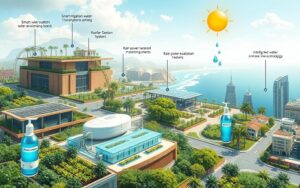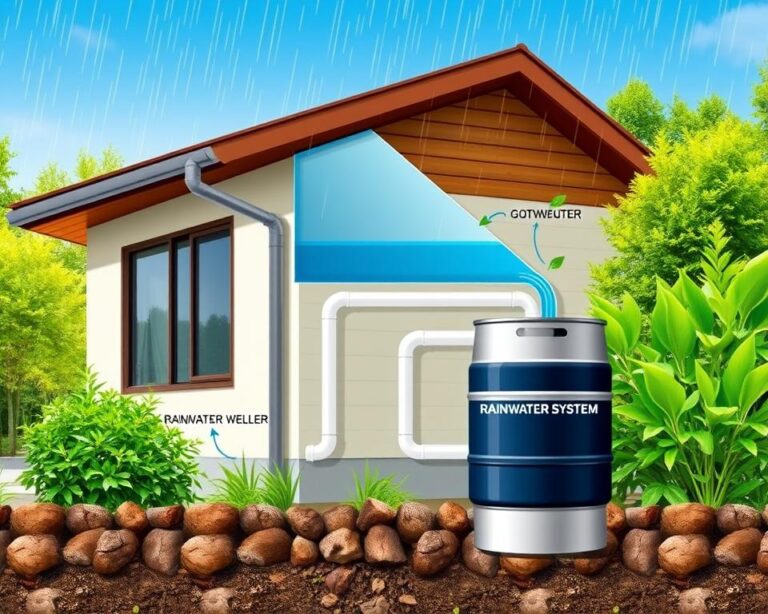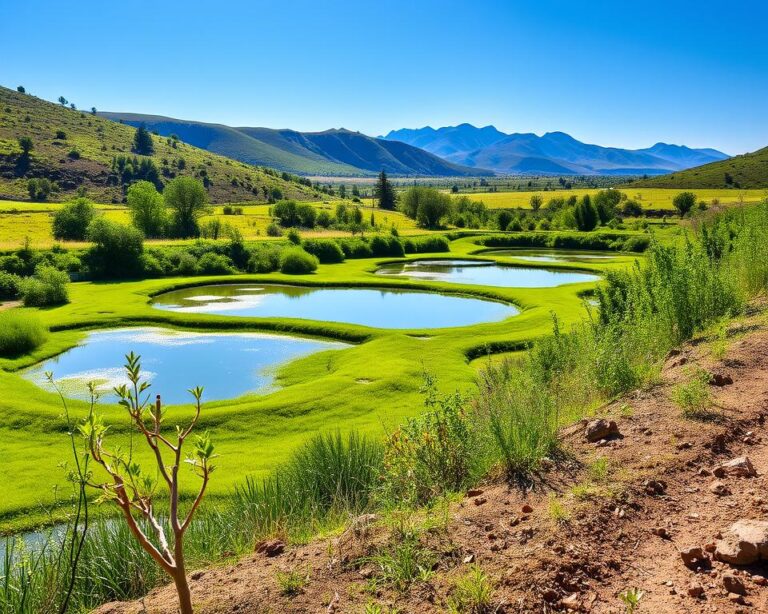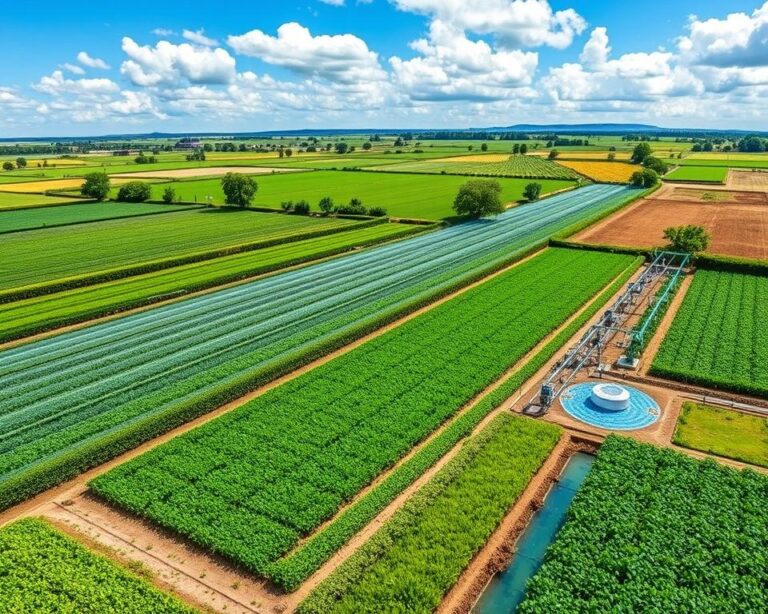A staggering 40% of the world’s population will face water scarcity by 2030. This shows how crucial water conservation and saving water are. Technology is key in making water conservation efforts more effective.
The world is facing a severe water crisis. We need new ways to save this vital resource. Water conservation affects the environment, economy, and our health. By understanding its benefits, we can build a more sustainable future.

Technology is leading the way in saving water. It includes smart irrigation systems and water-saving appliances. These innovations help reduce water waste and promote efficient use. Saving water is vital, and we must make it a priority in our daily lives.
Introduction to Water Conservation Technology
Water conservation technology has grown a lot over the years. It now offers many ways to save water. From simple ideas like catching rainwater to complex systems like making saltwater drinkable, there are many new solutions.
It’s very important to use water wisely every day. By using water-saving methods, we can use less water. This helps our planet and future. Simple tips include fixing leaks, using less water appliances, and catching rainwater for other uses.
Overview of Water Conservation
Water conservation means using less water and keeping it safe. It includes many strategies and techniques. Some key parts are:
- Water-efficient appliances and fixtures
- Smart irrigation systems
- Rainwater harvesting and greywater reuse
- Water-saving practices and behaviors
History of Water Conservation Technology
Water conservation technology has been around for a long time. Ancient people used simple ways to save water. Today, we have more advanced methods thanks to technology.
Knowing how water conservation technology has changed helps us see its value. We must keep finding new ways to save water. This is key for a future where water is not a problem.
| Water Conservation Method | Description |
|---|---|
| Rainwater Harvesting | Collecting and storing rainwater for non-potable purposes |
| Greywater Reuse | Reusing greywater for irrigation and other non-potable purposes |
| Smart Irrigation Systems | Using advanced technology to optimize irrigation schedules and reduce water waste |
Importance of Water Conservation
Water conservation is key to a healthy environment and economic growth. It’s crucial for keeping ecosystems healthy, reducing pollution, and protecting wildlife. By using water wisely, we help create a better future.
Water conservation has big environmental benefits. It helps in many ways:
- Preservation of ecosystems and biodiversity
- Reduced pollution and improved water quality
- Enhanced food security and sustainable agriculture
Water conservation also boosts the economy. It can lower water treatment costs, increase efficiency, and spur economic growth. By focusing on water conservation, we ensure a prosperous future for all.
Understanding water conservation’s importance helps us reduce our water use. We can do this by cutting down on waste, using efficient appliances, and supporting water-saving efforts. These simple steps lead to a more sustainable world.
Smart Irrigation Systems
Smart irrigation systems are key in saving water today. They use new tech like sensors, drones, and satellite images. This helps farmers use less water, grow more crops, and protect the environment.
These systems have cool features like watching water use in real-time and setting up watering schedules. They also have sensors to check soil moisture. This lets farmers make smart choices, saving water and growing better crops.
Some great things about smart irrigation for farming are:
- Improved crop yields
- Reduced water consumption
- Minimized environmental impact
- Increased efficiency and productivity
By using smart irrigation, farmers help save water and make more money. As the world’s population grows, saving water becomes even more important. Smart irrigation systems are a big help in making farming sustainable.
Water-Saving Appliances
Water-saving appliances are key to cutting down household water use. They help in conserving water. By using efficient toilets, faucets, dishwashers, and washing machines, we can use less water. This supports water conservation efforts.
These appliances have special features like low-flow rates and automatic shut-off. They also have advanced sensors. These features cut down on water waste and make water use better. For instance, efficient toilets use much less water per flush. Low-flow faucets also use less water without losing performance.
Efficient Toilets and Faucets
Efficient toilets and faucets save water without losing quality. They offer many benefits:
- Lower water bills
- Less harm to the environment
- They last longer and work better
Dishwashers and Washing Machines
Dishwashers and washing machines are also important for saving water. Look for ones with:
- Low-water cycles
- Advanced sensors for better water use
- Energy-saving designs
Using water-saving appliances in our daily lives helps conserve water. It supports water conservation efforts. This makes a big difference for the environment.
| Appliance | Water Savings | Benefits |
|---|---|---|
| Efficient Toilets | Up to 20% per flush | Lower water bills, less environmental harm |
| Low-Flow Faucets | Up to 30% per minute | Longer life, less water waste |
| Water-Efficient Dishwashers | Up to 40% per cycle | Energy saving, less water use |
Rainwater Harvesting Technologies
Rainwater harvesting is a simple, yet effective way to conserve water. It involves collecting and storing rainwater. This way, households can use less municipal water.
Using a first flush device and a screen are good tips. They help keep the water clean. Also, regular checks on the system are key to its success.

- Roof catchment: This is the most common method, where rainwater is collected from the roof of a building.
- Ground catchment: This method involves collecting rainwater from a paved or unpaved surface.
There are many ways to store rainwater, like tanks, cisterns, and ponds. The right choice depends on how much water you need, the space you have, and how you plan to use it.
| Storage Solution | Capacity | Cost |
|---|---|---|
| Tank | 1,000-10,000 gallons | $500-$5,000 |
| Cistern | 10,000-50,000 gallons | $5,000-$20,000 |
| Pond | 50,000-100,000 gallons | $20,000-$50,000 |
By using rainwater harvesting, we can all help save water. It lowers our water bills and helps our planet.
Water Management Software
Effective water management is key for significance of water conservation and importance of sustainable water use. Water management software is essential. It offers real-time monitoring and data analytics.
This software helps households, businesses, and governments use water wisely. It reduces waste. Key features include:
- Real-time monitoring of water consumption
- Data analytics for efficiency
- Automated alerts for leaks and other issues
- Customizable reporting and dashboards
Using water management software, people and organizations can make better water use choices. This reduces environmental harm and saves money. The importance of sustainable water use is huge, and this software is a big help.
As water scarcity and conservation challenges grow, so will the need for water management software. Its role in significance of water conservation efforts will expand.
| Feature | Benefit |
|---|---|
| Real-time monitoring | Identify leaks and issues quickly |
| Data analytics | Optimize water usage and reduce waste |
| Automated alerts | Receive notifications for potential issues |
Leak Detection Technology
Leak detection technology is key in saving water. It helps homes and businesses use less water and protect the environment. By finding and fixing leaks early, people can save water and follow good water-saving tips.
There are many leak detection systems out there. These include acoustic sensors and flow meters. They help track water use and spot problems quickly. This leads to several benefits:
- Reduced water waste
- Lower water bills
- Minimized risk of water damage
Using leak detection technology can greatly help in saving water. It’s a big step towards reducing water use and following water-saving tips.
Types of Detection Systems
There are many types of leak detection systems. Each has its own special features and advantages. Here are some common ones:
Cost Savings from Leak Prevention
Stopping leaks can save a lot of money and help the environment. By using water-saving methods and tips, people can cut down on water use. This also means lower water bills.
Desalination Innovations
Desalination is key for getting fresh water where it’s scarce. By improving desalination tech, we can lessen its environmental harm. This supports water saving efforts.
New ways to power desalination plants use solar and wind energy. This cuts down on carbon emissions, making desalination greener. Also, new membranes boost efficiency and lower energy needs.
Advances in Desalination Technology
These tech improvements help water saving by offering steady fresh water. The benefits include:
- Less energy use
- Lower costs
- Better efficiency
Sustainability Considerations
As desalination tech grows, we must think about its green impact. We need to check how desalination plants affect the environment. By backing water saving and green desalination, we ensure water for the future.
Greywater Recycling Systems
Greywater recycling systems are key in saving water. They help homes and businesses use less water and harm the environment less. By using treated greywater from sinks, showers, and washing machines, we can water plants and flush toilets.
These systems also save potable water. This is crucial in places where water is scarce. It helps keep drinking water available for essential needs.
How Greywater is Treated
Greywater treatment cleans the water for safe reuse. It goes through filters, sedimentation, and disinfection. This makes it ready for irrigation, toilet flushing, and washing machines.
Applications in Home and Industry
Greywater recycling works in homes and businesses. At home, it waters lawns and gardens, and flushes toilets. In agriculture, it irrigates crops, saving freshwater and reducing farming’s environmental impact.
Using greywater recycling helps a lot with water conservation. It cuts down water use and supports sustainable water use. It’s a big step towards saving water for the future. Combining it with other water-saving tips can make an even bigger difference.
| Benefits of Greywater Recycling | Applications |
|---|---|
| Conserves potable water supplies | Residential irrigation |
| Reduces water consumption | Commercial crop irrigation |
| Minimizes environmental impact | Industrial processes |
Role of Water Conservation Legislation
Water conservation laws are key in showing the significance of water conservation and the importance of sustainable water use. They set rules and standards for saving water. This encourages homes, businesses, and industries to use less water.
Some important parts of water conservation laws include:
- Setting water efficiency standards for appliances and fixtures
- Implementing rainwater harvesting and greywater reuse systems
- Encouraging the use of drought-resistant plants and efficient irrigation systems
Good water conservation laws bring many benefits. They help use less water, save money on energy, and cut down on wastewater. As water scarcity grows, so does the need for saving water.
Together, we can make sure future generations have enough water. By supporting water conservation and sustainable use, we’re working towards a water-secure future.
| Benefits of Water Conservation Legislation | Description |
|---|---|
| Reduced Water Consumption | Lower water bills and decreased strain on water resources |
| Lower Energy Costs | Decreased energy consumption for water treatment and pumping |
| Decreased Wastewater Generation | Less wastewater to treat and dispose of, reducing environmental impacts |
Future Trends in Water Conservation Technology
Looking ahead, the future of water conservation is bright. New smart irrigation systems, water-saving appliances, and desalination breakthroughs are on the horizon. These innovations will change how we use water, making it more sustainable for the future.
Artificial intelligence and real-time data analytics will make water management smarter. This means we’ll use water more efficiently and accurately. Also, better leak detection technology will cut down on water waste, saving money for everyone.
Greywater recycling systems will get even better, helping us use water more efficiently. This is crucial as the world’s water demand grows. By adopting these new technologies, we can make our world more sustainable and ensure clean water for all.
FAQ
What is the importance of water conservation?
Saving water is key for a healthy planet and economic growth. It keeps ecosystems balanced, cuts pollution, and saves biodiversity. It also brings economic gains like lower water treatment costs and more efficient use of water.
What are the benefits of water-saving appliances?
Using water-saving appliances like efficient toilets and dishwashers cuts down household water use. This helps the environment and saves money on water bills.
How do smart irrigation systems improve water conservation?
Smart irrigation uses tech like sensors and drones to use water wisely. It helps farmers grow more with less water, reducing environmental harm.
What are the methods of rainwater harvesting?
Rainwater harvesting collects and stores rainwater for use. It includes roof and ground systems and tanks. It helps reduce reliance on municipal water and lowers environmental impact.
How does water management software enhance water conservation efforts?
Water management software tracks water use in real-time. It helps make smart water choices and find ways to use less. It’s useful for homes, businesses, and governments.
What are the benefits of leak detection technology?
Leak detection finds and fixes leaks, saving water and money. It’s key for homes and businesses to cut water waste and save on repairs.
How does greywater recycling contribute to water conservation?
Greywater recycling uses treated water from sinks and showers for irrigation and flushing. It cuts down on overall water use and environmental harm.
What is the role of water conservation legislation?
Laws for water conservation push for sustainable use. They set standards for saving water, leading to more efficient use and less waste.
What are the future trends in water conservation technology?
Future water-saving tech looks promising. Advances in irrigation, appliances, desalination, and greywater recycling will change how we manage water. It’s a step towards a sustainable future.




